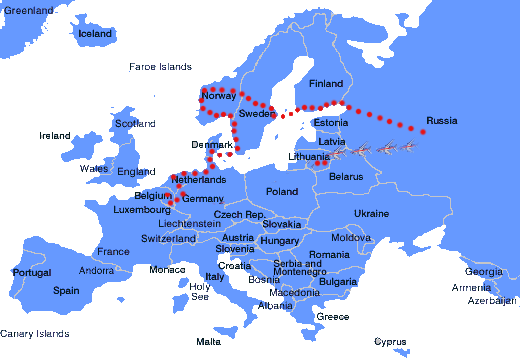In every city we visited so far we noticed
two European features that make these places very
different from New York. Firstly, it's the exceptional
quality of dairy products (or smoked fish if talking
about Norway). Secondly, it's the apparent absence of
police on the streets.
Without a cop posted
at every corner Europeans engage in all kinds of
outrageous behavior: they drink beer on the streets,
smoke in the bars, rollerblade inside railway
stations, bike on sidewalks, sitting on milk crates,
etc... Well, I am not even talking about what they do
Amsterdam! All this behavior is of course illegal in
New York, but here the society shows a much greater
degree of tolerance. Like it or not, but apparently
the majority here doesn't think that for these
offenses people should be taken to court. And
with a much smaller number of crimes subject to
prosecution, Europeans probably do not need so much
police, and those few officers they have are probably
running after thieves and murderers. That's why here
you don't see them idling in every donut shop.
We didn't see law enforcement in action until we
reached the 'free and hanseatic city of Hamburg'. This
is how the tour book calls this place. Hamburg
is a separate state in Germany, and being 'free and
hanseatic' it's entitled to making up its own laws
one, of which instantly reminded me of New York.
Right in the beginning of our city walk we came across
a street musician who assembled his sound making
machine out of impossible number of stuffed animals,
broken hangers, pieces of furniture and every other
imaginable type of garbage. All together it was making
quite a pleasant sound that people, adults and
children alike, seemed to like. We stopped to listen
as well. But then two cops walked by... To give them a
credit, they discretely waited until the song is over,
but then the walked to the musician, said something,
checked his papers, wrote something in their
book...while the crowd was still waiting for the
continuation of the show. But afterwards there was no
more fun - man packed his machine and left, much to
everybody's disappointment. Everything happened
very calmly without any excesses, I don't even think
that the performer was fined, yet the scene had a very
ugly feeling about it. Two big guys with guns are
harassing one harmless little guy with bells around
his ankles - and nobody calls police to stop it,
because these armed guys are police themselves
and the Law stands behind them. It felt like if I got
into the inverted, 'behind the looking glass' world,
where the notions of good and bad are completely
messed up. Well, I often feel that way back at home.
And as for the Hamburg, it is certainly a fine
interesting city, but this incident cast a long shadow
over my perception of the city. It took me a while
before I shook it off of my mind.
And Zara was also disappointed: 'And nobody
defended him! In Dushanbe
people always protest
when police chases somebody unjustly... And police
usually leaves..'
Well, how can she prefer the instinctive reflexes
of wild tajiks over the obedience of the civilized
Germans. These are brought up to respect the Law and
Order above anything else, just the same way they were
during the Third Reich.

1 Comments:
Je te comprends parfaitement! Because I have some basic knowledge of 4 Romance languages (French, Spanish, Italian, Portuguese, in order of my familiarity with them), I constantly get tongue-tied the first few days I'm in one of those countries. Usually I gravitate towards French (e.g., "oui" instead of "si", "merci" instead of "gracias", just as you said) because I know it better than the others. That passes after the first 2-3 days, however.
Regarding your "pochem klubnichka?" comment - I'll never forget how you walked into a little store in Princeton and said the sales clerk: "Ya izvinyaus'..." (the bewildered clerk turned his head to you) "A skol'ko eto stoit?" The amazing thing was that he told you the price and you didn't even realize you asked in Russian. :0)
- Serge Shamis
Post a Comment